Fantasy Out Loud III: Suffer the Children?
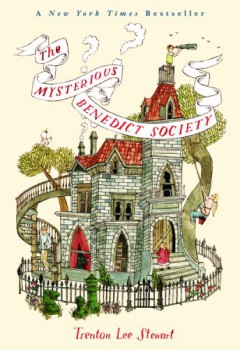 In the original 2011 edition of Fantasy Out Loud, I took a stab at reviewing the fantasy books I had read aloud to my children. Back in those halcyon days, The Hobbit was front and center.
In the original 2011 edition of Fantasy Out Loud, I took a stab at reviewing the fantasy books I had read aloud to my children. Back in those halcyon days, The Hobbit was front and center.
Some eighteen months later, my boys are older and taller, but not necessarily wiser. Much to my chagrin, older son Corey, aged thirteen as of this writing, no longer wants me to read aloud to him prior to bedtime. On his own, he’s lately polished off all four of the Hitchhiker’s Guide books, and is now slamming through Arthur C. Clarke’s Childhood’s End, which he describes as “weird.” (We’ll see what he says when he gets to the end, one of the best reveals in written English.)
But, because Corey is tackling these titles on his lonesome ownsome, this column is necessarily dedicated to eight-year-old Evan, who still can’t get enough of pre-bed daddy readings.
In the last year, fantasy titles we’ve tackled include The Warriors: Into the Wild, The Mysterious Benedict Society, Black Beauty, Summerland, Tuck Everlasting, and Magic By the Lake.
Well, all right: Black Beauty isn’t strictly fantasy, since author Anna Sewell never allows Beauty to actually speak, but for a horse to be so observant, so proscriptive, so downright brilliant? Sounds like fantasy to me.
Here’s the rub: Evan did not like these books equally. Nor do his growing sense of taste and literary discretion always parallel, sadly, my own. At least two of the books above were volumes I would have preferred to hurl across the room, but in one case especially, despite my jaundice, Evan was enraptured.
The title that really deserved a good wall-throwing was Erin Hunter’s The Warriors. Cat lovers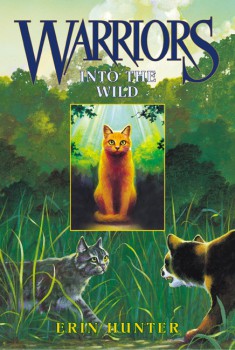 beware: not only does this title put the tiger in the tabby, but curiosity very nearly kills our hero-cat, Firepaw.
beware: not only does this title put the tiger in the tabby, but curiosity very nearly kills our hero-cat, Firepaw.
Firepaw is living a quiet domestic life with a twolegs couple when one evening he strays into the surrounding forest and meets the cats of Thunderclan. After a brief scuffle, these feral warrior cats invite Firepaw to join them. Firepaw throws his soft life over for the forest, and thus hijinks, betrayals, and a startling number of lethal battles ensue.
Conceptually, territorial cats eking out a tough existence in what I suppose must be rural England sounds great. In reality, Hunter talks down to the very readers at whom she aims. Every motive is explained, every action clarified.
By the fourth chapter, I was committing the great cardinal sin of the out-loud reader: I was actively editing as I proceeded. And of course I felt unclean for doing so, but I couldn’t help it; about a quarter of the verbiage in The Warriors was wasted, repetitive, and/or condescending.
My dismay didn’t register in the least on Evan. During tense moments (tense, at least, within the confines of the book), Evan would curl up into a ball on the floor, then spring to his feat, arms and legs flailing in all directions at moments of victory. At least twice, he cheered.
To say he loved this book would be an understatement. In keeping with the title’s claws-out theme, I’d have to say he positively lapped it up.
For both children and adults, The Mysterious Benedict Society begins with a stroke of absolute and unquestioned brilliance. Orphaned misfit Reynie Muldoon answers an ad that promises bright young children untold opportunities –– but only if he can first pass a series of challenging tests. The novel’s conceit is that readers can compete right alongside Reynie and his growing circle of friends, and the tests prove to be engaging, clever, and delightfully sidelong: they’re the absolute antithesis of the SAT.
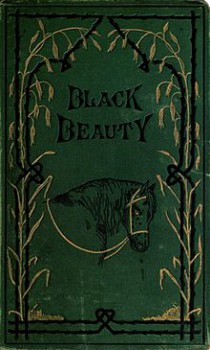 Did Evan drool over these opening sequences as much as I? He did, and he was proud of himself for solving at least one of the situational puzzles on his own.
Did Evan drool over these opening sequences as much as I? He did, and he was proud of himself for solving at least one of the situational puzzles on his own.
Unfortunately, after these opening chapters, the book’s energy and level of invention flags. Sure enough, once again, there’s an evil genius out to take over the world (with his brain enhancing whisper-machine, no less), and it’s up to a band of rag-tag children to stop him.
Child saviors? Again? Somebody please cover my mouth while I yawn.
The novel is not a failure by any means, and Evan enjoyed this opening salvo enough to move on to others in the series, The Mysterious Benedict Society and the Perilous Journey, and The Mysterious Benedict Society and the Prisoner’s Dilemma. I, however, in my capacity as Chief Out-Loud Reader, elected to shift camp to more trusted pastures.
Black Beauty, for instance, a delightful tale told with sly wit, great love, and a wonderful eye for detail. True, the vocabulary can trip up even a semi-eddicated fellow like myself, and pauses to explain the various workings of horse-drawn carriages-that-were became the norm for much of the book, but the overall reading experience was extremely positive.
Sewell is a nimble and underappreciated writer. Like Harper Lee, this was Sewell’s one and only outing, and the world is richer for her effort, but poorer for her not having ventured again into the waters of fiction.
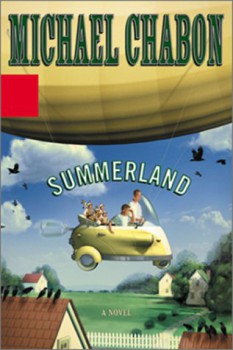 After that, we climbed aboard Michael Chabon’s Summerland. I associate Chabon with Neil Gaiman; everybody loves them, yet I was fairly unfamiliar (at the time) with both.
After that, we climbed aboard Michael Chabon’s Summerland. I associate Chabon with Neil Gaiman; everybody loves them, yet I was fairly unfamiliar (at the time) with both.
Well. After Summerland, neither Evan nor I are in any hurry to read more of Chabon’s canon. Summerland, a supremely episodic work knit together with various fairy-inflected games of baseball, never gathers momentum. By the end, both Evan and I were restless, listless, and ready for “The End.”
Evan always plays with Lego as I read, but over the course of Summerland, his Lego play grew louder and louder, to the point where I doubt he could hear what I was saying. No finer meter exists to gauge this young fiction aficionado’s interest.
Tuck Everlasting proved to be another difficult sell, but only at the beginning. Author Natalie Babbit is in no hurry whatsoever, and at heart she’s a nature writer; her descriptive powers are exceptional, deftly employed, and prove (by novel’s end) to be entirely in the service of her beautiful story.
Once upon a time, a grade-school teacher read this book aloud to me –– third grade, I believe it was, and I remember being rapt. I hoped that Evan, a new third-grader at the moment we embarked on this reading, would be the perfect target audience.
The slog of the opening chapters, where the stakes are obfuscated by backstory and an oppressive heat and humidity that pour right off the page, was soon replaced, for Evan, by a single burning question: should Winnie Foster drink from the spring that made the Tuck family immortal?
To be fair, this evolved into a second question: would Evan himself drink from such a fountain of youth, given the chance?
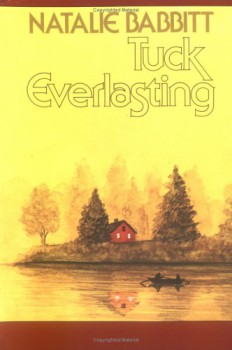 As a parent, I was delighted that the book engaged Evan on such a deep level, but I admit to being somewhat dismayed by his cogent, adult answer to how he himself would handle Winnie’s situation. He wouldn’t drink, or so he told me, because he didn’t want to live forever; he worried that eventually he would get bored.
As a parent, I was delighted that the book engaged Evan on such a deep level, but I admit to being somewhat dismayed by his cogent, adult answer to how he himself would handle Winnie’s situation. He wouldn’t drink, or so he told me, because he didn’t want to live forever; he worried that eventually he would get bored.
“Don’t worry,” he told me, “I want to live a long, long time. But I don’t know about forever.”
Holy crap.
So obviously, Tuck Everlasting gets my vote as an Excellent and Essential Read for Young People.
As for Magic By the Lake, it’s a comic delight. Edward Eager, the Ohio-born devotee of E. Nesbitt, takes Nesbitt’s formula of four well-behaved and very independent children discovering some sort of magical talisman and makes it his own.
If his four child-heroes are somewhat indistinguishable, that’s all right; it’s the trouble they get themselves into that matters most. And, as in J.K. Rowling’s much later creations, it’s teamwork that saves the day more often than not.
The series really begins with Half-Magic, a title I read aloud to older boy Corey several years ago, and if there’s a funnier gag in kid’s lit than a half-intelligible talking cat, I’ve never encountered it. (Firepaw, take note.)
With Magic By the Lake, the same foursome reunites for a potentially sleepy summer holiday. Lucky them: in no time, they meet a cranky turtle that grants wishes, and next thing you know, the entire lake is boiling with sea-dragons, mermaids, tritons, and goodness knows what else.
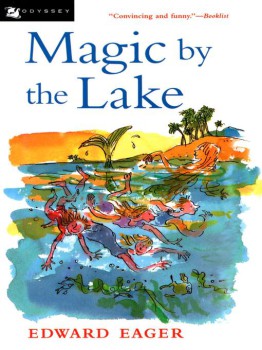 Of course, the adults take no notice and it’s here that both Nesbitt and Eager score most heavily: children love books in which their peers pull the wool over adult eyes. Not only did Magic By the Lake make Evan laugh out loud, it gave him a chance to be, vicariously, in charge.
Of course, the adults take no notice and it’s here that both Nesbitt and Eager score most heavily: children love books in which their peers pull the wool over adult eyes. Not only did Magic By the Lake make Evan laugh out loud, it gave him a chance to be, vicariously, in charge.
Finally, I must give a nod to the dreaded Magic Tree House series, authored by Mary Pope Osborne. Also known as the “Jack and Annie” books, these titles are aimed at kindergartners, but a good many primary school teachers stock Jack and Annie in their classrooms to tempt otherwise reluctant readers into a world of adventure, some solidly based in history.
After penning twenty-plus of these short-form fantasies, this reader, at least, sensed that Osborne’s personal well of inspiration was running dry. The early stories, some of them lively to the point of being hyperactive, had turned stale, formulaic (and believe you me, I’ve read every one of the Magic Tree House books, often many times over).
And then, something magical happened. Unlike so many other authors who became bored by their creation, and bitter about the necessity of continuing to churn out more of the same, Osborne became inspired. She sent Jack and Annie off into the Lands of Faerie. With Merlin and Morgan le Fay, no less, as guides.
The best of these “Merlin Missions” by quite some distance is Summer of the Sea Serpent, the thirty-first entry in the Jack and Annie series. In Summer, Jack and Annie are sent to recover Excalibur, and after several quite hair-raising adventures, they do indeed find the sword.
They also find the sword’s guardian, a variant on the Midgard Serpent, and this reptilian monstrosity refuses to give up the enchanted blade unless Jack and Annie correctly answer a single, apparently simple question: “What isss the purpossse of the sssword?”
A sword’s purpose is to kill, of course. To defend hearth and home; to drive off enemies.
Happily, Osborne gets to the heart of the Arthurian Mythos via a different and beautifully unexpected answer, one that I will not reveal here in hopes that you, gentle reader, will take a peek at this short, easy-to-speed-read book yourself. (If you’re not a parent and don’t already own it, trust me, your local library has a copy.)
Not only was this my favorite book in the Jack and Annie canon, it was also Evan’s, who in years past requested it time and time again. Was this because he could sense the reverence with which I handled the reading?
Possibly –– but then, I try to fling myself into every title we read, even The Warriors. No, I like to think Evan’s preference for this title is more basic: it’s a strong book, and even at age six, he could sense its quality.
“And what is good, Phaedrus, and what is not good? Need we ask anyone to tell us these things?”
Until next time, dream hard.
Write harder.
(And if you want more titles that might be worth sharing with your children, do check out my original posting in this occasional series, Fantasy Out Loud.)
Mark Rigney’s latest story for Black Gate was “The Find,” which Tangent Online called “reminiscent of the old sword & sorcery classics… A must read.” You can see what all the fuss is about here.
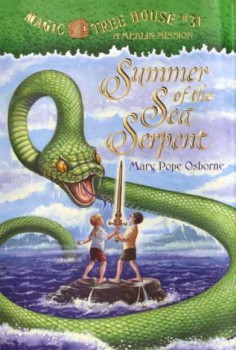
I enjoyed this. my first child, a boy, is due late october. i’ve already thought about what to read to him. even though thats years down the road.
I keep thinking of read Howard Pyle’s The Adventures of Robin Hood. but i don’t think that book is understandable by children due to the older English used.
Did you read the hobbit to either of your sons and at what age?
In reading to my own three children, far and away the favorites were the Oz books and the “juveniles” of Robert Heinlein (especially Red Planet). They also enjoyed the gothic/supernatural mysteries of John Bellairs. Another big hit was the Prydain series by Lloyd Alexander – maybe my kids would put those books over Oz, even. Thurber’s The 13 Clocks was asked for often, but it’s challenging for the person reading it aloud – your concentration can never waver! Some fine books – and personal favorites – didn’t work very well as read alouds. The Hobbit was ok, but those long chapters – I had to subdivide them, and sometimes Tolkien doesn’t make it easy to find a good breaking place. Narnia wasn’t as successful as I’d hoped (the preachiness seems more obtrusive when read aloud, for some reason), and my one attempt to read an Edgar Rice Burroughs Mars book was a complete disaster, which I should have foreseen.
Another fine Natalie Babbitt that worked well for us as a read aloud is The Search For Delicious. It’s a real fantasy – it has a map!
If they don’t mind something a bit scary (well, “deliciously creepy” hits closer to the mark) then you could do much worse than Neil Gaiman’s Coraline.
Thanks for the feedback, one and all. I’ve been in the wildnerness where the web won’t go, so please pardon my late response.
Glenn – check out my earlier Fantasy Out Loud posts for details on the Hobbit. Yes, I read it to both boys, and to Evan more than once. Starting at age seven, I believe?
EMC – so glad you mentioned John Bellairs! A horror hero. Also, I was unaware of The Search for Delicious. I’ll check it out.
Joe – my kids are entirely unable to handle Coraline, a book I didn’t much care for. Corey refuses to crack the cover, although he gamely watched the movie. The movie sent younger boy Evan into unexpected and very sudden hysterics at about the midway point. For two weeks, he slept with the closet light on. So much for Coraline. Thanks, Mr. Gaiman.
[…] Fantasy out loud III: Suffer the Children? […]
[…] additional titles I would recommend (or steer you far clear of), do check out Fantasy Out Loud and Fantasy Out Loud III, both of which are still lodged right here on the digital (dust free!) shelves of Black Gate. So, […]
You did, indeed, review “Magic by the Lake,” Mark. 😀 What fun! And a great time to have enjoyed with your sons.
Agreed, regarding the qualities of the “Warriors” series. One of my parents made a point of reading books to potentially recommend to reluctant readers in high school, and I think that one got ignored after a few books.
Reading “Tuck Everlasting” to Evan was a kindness and a mercy. If a parent or teacher reads it to the recipient, it’s probably much better. That one ended up in the Required Reading Hall of Loathing for me, along with “Bridge to Terabithia,” “The Giver,” “Heart of Darkness,” “Cold Sassy Tree,” and “God of Small Things.” (Since only the last title got added to the list beyond public ed., I’m pretty sure the system wanted its teenagers existentially challenged, depressed, and suicidal.)
Your thoughts on “Black Beauty” made me wonder if you’d ever read the “Silver Brumby” series. Those were the quintessential horse books in my home, to the point where the “Saddle Club” series was a bit of a disappointment when age-appropriate. Did Thowra ever gallop across your library?